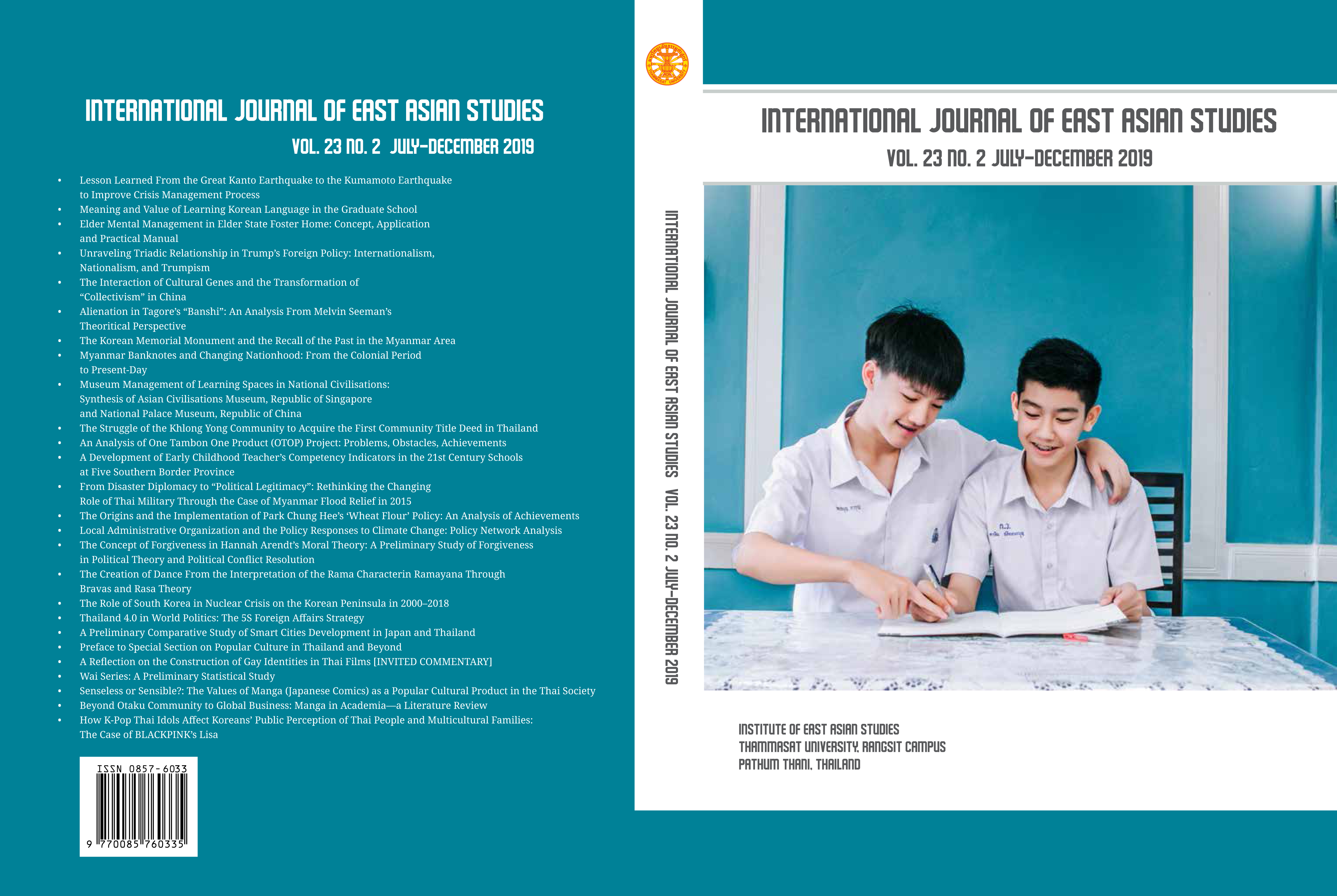การต่อสู้ของชุมชนคลองโยงเพื่อได้มาซึ่งโฉนดชุมชนแห่งแรกของประเทศไทย
คำสำคัญ:
หลักวิริยะ, หลักอหิงสา, โฉนดชุมชน, ขบวนการเคลื่อนไหวทางสังคมบทคัดย่อ
งานวิจัยนี้มีวัตถุประสงค์ คือ (1) เพื่อศึกษาความเป็นมาและอธิบายถึงปัจจัยที่เกี่ยวข้องที่ทำให้กลุ่มชุมชนคลองโยง จังหวัดนครปฐมประสบความสำเร็จในการได้รับโฉนดชุมชนแห่งแรก และ (2) เพื่อศึกษาการใช้หลักวิริยะและอหิงสาในการได้มาซึ่งโฉนดชุมชนของกลุ่มชุมชนคลองโยง จังหวัดนครปฐม รูปแบบการวิจัยเป็นเชิงคุณภาพ ใช้แนวคิดการครองที่ดินแบบกรรมสิทธิ์ร่วม ทฤษฎีบันใดการมีส่วนร่วม ขบวนการเคลื่อนไหวทางสังคม และยุทธวิธีในการต่อสู้ และนำหลักวิริยะเรื่องความเพียรและหลักอหิงสาเรื่องการสู้แบบไม่ใช้ความรุนแรงมาตีความข้อมูลและเป็นกรอบในการวิจัย พื้นที่ในการวิจัยคือชุมชนคลองโยง จังหวัดนครปฐม กลุ่มตัวอย่างคือ ผู้ให้ข้อมูลสำคัญจำนวน 9 คน ใช้วิธีเลือกแบบแบบเจาะจง (Purposive Sampling) เครื่องมือที่ใช้ในการวิจัยคือ การสัมภาษณ์เชิงลึก และการสนทนากลุ่ม วิเคราะห์ข้อมูลโดยการใช้ทฤษฎีที่เกี่ยวข้องมาวิเคราะห์ข้อมูล การตรวจสอบข้อมูล และการตีความข้อมูล
ผลการศึกษาพบว่า (1) ชาวบ้านคลองโยงรวมตัวกันเรียกร้องความเป็นธรรมในกรรมสิทธิ์ครอบครองที่ดินต่อหน่วยงานราชการต่าง ๆ เป็นเวลาหลายปีแต่ไม่สำเร็จ จนกระทั่งมีนักวิชาการชักชวนให้เข้าร่วมต่อสู้กับเครือข่ายปฏิรูปที่ดินแห่งประเทศไทย (คปท.)โดยร่วมกันเคลื่อนไหวหลายครั้งจนสามารถกดดันให้รัฐบาลเจรจากับผู้ชุมนุมและชุมชนคลองโยง จนสามารถได้รับโฉนดชุมชนแห่งแรกของไทย (2) ชาวบ้านคลองโยงมีการใช้หลักวิริยะในด้านความอดทนและเพียรพยายามในการต่อสู้มาอย่างยาวนาน และรูปแบบการเคลื่อนไหวได้ยึดหลักอหิงสาที่ต่อสู้โดยไม่ใช้ความรุนแรง ข้อค้นพบจากงานวิจัยนี้คือ ความสำเร็จของชุมชนคลองโยงมาจากการมีผู้นำชุมชนที่เข้มแข็ง การร่วมมือกับนักวิชาการและเครือข่ายต่าง ๆ และการใช้สื่อเป็นเครื่องมือกดดันรัฐบาล ภายใต้ความอดทนและเพียรพยายามในการต่อสู้ตามหลักอหิงสา และไม่สร้างความขัดแย้งกับหน่วยงานรัฐเหมือนพื้นที่อื่น ๆ ด้วยเหตุนี้ ชุมชนคลองโยงจึงเป็นพื้นที่นำร่องในการดำเนินนโยบายโฉนดชุมชนของรัฐบาล
Downloads
เอกสารอ้างอิง
Rajagopal P.V. (2557). อหิงสายาตรา บนเส้นทางสู่อินเดียอื่น (สายพิณ กุลกนกวรรณ ฮัมดานี, แปล). กรุงเทพฯ: สวนเงินมีมา.
เพิ่มศักดิ์ จะเรียมพันธ์. (2555). การเมืองของกระบวนการกำหนดนโยบายโฉนดชุมชน (วิทยานิพนธ์ปริญญามหาบัณฑิต). จุฬาลงกรณ์มหาวิทยาลัย, กรุงเทพฯ.
ไชยรัตน์ เจริญสินโอฬาร. (2540). ขบวนการเคลื่อนไหวทางสังคมรูปแบบใหม่. กรุงเทพฯ: ศูนย์วิจัยและผลิตตำรา มหาวิทยาลัยเกริก.
ชวลี ไชยธีระพันธ์. (2522). อหิงสาในความคิดของมหาตมะคานธี (วิทยานิพนธ์ปริญญามหาบัณฑิต). จุฬาลงกรณ์มหาวิทยาลัย, กรุงเทพฯ.
ณรงค์ บุญสวยขวัญ. (2552). การเมืองภาคพลเมือง. กรุงเทพฯ: ศูนย์การศึกษาเศรษฐศาสตร์การเมือง.
ประภาส ปิ่นตบแต่ง และกนกรัตน์ เลิศชูสกุล. (2556). เอกสารประกอบการสอนวิชากลุ่มผลประโยชน์และการเคลื่อนไหวทางสังคม. หลักสูตรการเมืองและการจัดการปกครอง ภาควิชาปกครอง คณะรัฐศาสตร์ จุฬาลงกรณ์มหาวิทยาลัย
ปิยะนาถ วชิรบัณฑูร. (2554). การสร้างฉันทามติเพื่อการถือครองที่ดินแบบโฉนดชุมชนในที่ดินกรรมสิทธิ์ส่วนบุคคล : กรณีศึกษาชุมชนคลองโยง จังหวัดนครปฐม (วิทยานิพนธ์ปริญญามหาบัณฑิต). จุฬาลงกรณ์มหาวิทยาลัย, กรุงเทพฯ.
พระธรรมกิตติวงศ์. (2548). พจนานุกรมเพื่อการศึกษาพุทธศาสตร์ ชุดคำวัด. กรุงเทพฯ: วัดราชโอรสาราม
พระพรหมคุณาภรณ์. (2551). พจนานุกรมพุทธศาสตร์ ฉบับประมวลธรรม. กรุงเทพฯ: มหาวิทยาลัยมหาจุฬาลงกรณราชวิทยาลัย.
วรรณสิริ สุจริต. (2553). บุคลิกภาพห้าองค์ประกอบ อิทธิบาท 4 การสนับสนุนทางสังคมและพฤติกรรมความสุขในการทำงาน (วิทยานิพนธ์ปริญญามหาบัณฑิต). มหาวิทยาลัยรามคำแหง. กรุงเทพฯ.
วารุณี ณ นคร. (2554). ยุทธศาสตร์การสร้างพลังพื้นที่สื่อของขบวนการเคลื่อนไหวทางสังคมในประเทศไทย (วิทยานิพนธ์ปริญญาดุษฎีบัณฑิต). จุฬาลงกรณ์มหาวิทยาลัย. กรุงเทพฯ.
นักข่าวพลเมืองคลองโยง. (2554). นักข่าวพลเมือง: “คลองโยง” กว่าจะเป็นโฉนดชุมชนแห่งแรก. สืบค้นจาก http://prachatai.com/journal/2011/01/32783
Translated Thai References
Rajagopal P.V. (2014). Ahingsa yatra bon senthang su India uen (Saiphin Kunkanokwan Hamdani, Trans.). Krung thep: Suan ngoen mi ma.
Charamphan, P. (2001). Kanmuang kho̜ng krabuankan kamnot nayobai chanot chumchon (master’s thesis). Chulalongko̜nmahawitthayalai. Krung thep.
Charœnsin O-lan, C. (1997). Khabuankan khluanwai thang sangkhom rupbaep mai. Krung Thep: Sun wichai lae phalit tamra mahawitthayalai krœk.
Chaithiraphan, C. (1979). Ahingsa nai khwamkhit kho̜ng mahatmakhanthi (master’s thesis). Chulalongko̜nmahawitthayalai. Krung thep.
Bunsuaikhwan, N. (2009). Kanmuang phak phonlamuang. Krung Thep: Sun kansuksa setthasat kanmuang.
Wachirabanthun, P. (2011). Kansang chantha mati phua kan thu khro̜ng thidin baep chanot chumchon nai thidin kammasit suan bukkhon: ko̜rani suksa chumchon khlo̜ng yong changwat nakho̜n pathom (master’s thesis). Chulalongko̜nmahawitthayalai. Krung thep.
Pintoptaeng, P. & Loetchusakun, K. (2013). Ekkasan prako̜p kanso̜n wicha klum phonprayot lae kan khlueanwai thang sangkhom. Laksut kanmuang lae kanchatkan pokkhro̜ng, Phak wicha pokkhro̜ng, Khana ratthasat, Chulalongko̜nmahawitthayalai.
Phrathamkittiwong. (2005). Photchananukrom phua kansuksa phut sat chut kham wat. Krung Thep: Wat rat o rasa ram.
Phraphromkhunaphon̜. (2008). Photchananukrom phut sat chabap pramuan tham. Krung Thep: Mahawitthayalaimahachulalongkonratwitthayalai.
Sutcharit, W. (2010). Bukkhalikkaphap ha ongprako̜p itthi bat si kan sanapsanun thang sangkhom lae phruttikam khwam suk nai kanthamngan (master’s thesis). Mahawitthayalairamkhamhareg. Krung thep.
Na Nakon, W. (2011). Yutthasat kansang phalang phunthi su khong khabuankan khluanwai thang sangkhom nai prathet thai (Doctoral dissertation). Chulalongko̜nmahawitthayalai. Krung Thep.
Nakkhao phonlamuang khlo̜ng yong. (2011). Nakkhao phonlamuang: khlo̜ng yong kwa cha pen chanot chumchon haeng raek. Retrieved from http://prachatai.com/journal/2011/01/32783
เอกสารภาษาอังกฤษ
Arnstein, S. R. (1969). A Ladder of Citizen Participation. Journal of the Royal Town Planning Institute, 35(4).
Bajpai, S. (2011). The History of India - From Ancient to Modern Times. USA: Himalayan Academy Publications
Borman, W. (1986). Gandhi and Non-violence. USA: State University of New York Pres.
Iyer, R. (1973). The Moral and Political Thought of Mahatma Gandhi. New York: Oxford University Press.
McAdam, D. (1983). Tactical Innovation and The Pace of Insurgency. American Sociological Review, 48(6), 735-754.



